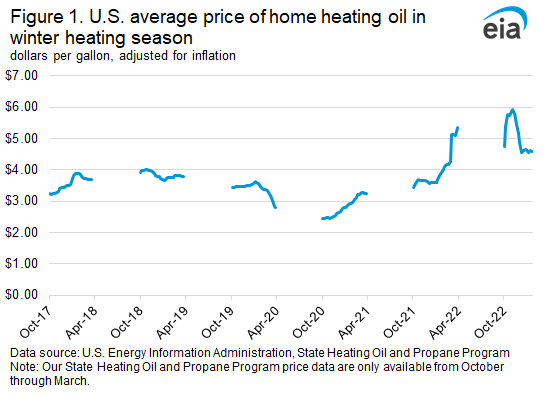Evaluating the Effect of Oil Rate Changes on Home Heating Expenses
The evaluation of the influence of oil rate changes on home heating costs is a critical area of study in the area of power business economics. As oil rates undergo fluctuations due to a selection of factors, comprehending their impact on heating prices is vital for property owners and policymakers alike - long island home heating oil prices. This research intends to clarify the historical patterns in oil rates, the elements that drive their variations, and the succeeding effects on home heating expenses. By analyzing this relationship, we can obtain valuable insights into the financial ramifications for house owners and check out potential policy steps to mitigate the effect of oil cost changes on heating costs. This research study seeks to add to a much deeper understanding of the dynamics between oil prices and home heating costs, giving valuable details for both people and decision-makers.
Historic Patterns in Oil Prices
Over the previous half a century, oil costs have actually experienced considerable fluctuations, impacting the price of home heating. Recognizing the historical patterns in oil costs is crucial for analyzing the effect on home heating prices.

In the 1980s and 1990s, oil costs experienced a duration of relative security. Technical improvements in oil removal and production, such as offshore drilling and shale oil removal, contributed to a constant supply and aided maintain costs in check. Occasional political tensions and conflicts in oil-producing areas proceeded to influence oil rates intermittently.
Given that the very early 2000s, oil costs have actually been subject to raised volatility. The increase of arising economies, particularly China and India, has actually brought about a surge in worldwide energy need, putting higher stress on oil rates. In addition, geopolitical stress in the Center East, environmental policies, and money variations have actually all included in the volatility in oil markets.
Variables Influencing Oil Rate Changes
Variables influencing oil price fluctuations include worldwide economic problems, geopolitical events, and supply and demand characteristics. These variables add to the volatility and changability of oil rates, affecting not just the energy industry yet also different markets of the economic situation and customers' wallets.
International economic conditions play a significant role in oil rate changes. Financial development and security in significant oil-consuming nations such as the United States, China, and India can cause increased need for oil, increasing costs. Conversely, economic recessions or downturns can lead to lowered demand, causing prices to fall.
Geopolitical events also have a significant effect on oil costs. Political instability, problems, and assents in major oil-producing regions such as the Middle East can interrupt oil supply and create unpredictability, bring about rate spikes. For instance, stress in the Persian Gulf area can interfere with the circulation of oil via the Strait of Hormuz, a crucial transportation point for worldwide oil deliveries.
Supply and need dynamics are essential variables that influence oil prices. When supply surpasses demand, prices often tend to fall, while when need goes beyond supply, costs tend to rise. Aspects such as manufacturing decisions by major oil-producing countries, changes in oil supplies, and disturbances in oil infrastructure can all impact the balance between supply and need, causing cost variations.
Recognizing these elements is critical for policymakers, energy companies, and consumers to anticipate and respond to oil price adjustments. By monitoring global economic conditions, geopolitical events, and supply and demand dynamics, stakeholders can much better handle the influence of oil price changes on home heating prices and various my link other markets of the economy.
Comprehending the Partnership In Between Oil Rates and Heating Prices
The relationship in between oil rates and heating costs can be comprehended by analyzing the effect of adjustments in oil costs on the expense of home heating. Oil rates play a considerable role in determining the quantity property owners pay to heat their homes throughout the winter season. When oil costs rise, the price of home heating oil likewise raises, which directly affects the expense of home heating. This click here for more is since heating oil is acquired from crude oil, and any kind of fluctuations in unrefined oil prices are shown in the cost of home heating oil.
When oil rates are high, house owners typically experience a spike in their home heating prices, as they need to purchase much more costly home heating oil to maintain their homes warm. On the various other hand, when oil prices are reduced, property owners take advantage of lower home heating expenses, as the price of home heating oil lowers. This connection in between oil costs and heating costs is especially crucial for households that rely upon heating oil as their primary resource of warm.
It is crucial for house owners to keep track of oil rates closely, as modifications in oil rates can have a significant influence on their month-to-month heating costs. By comprehending the relationship in between oil costs and heating expenses, home owners can make enlightened decisions concerning their heating systems and spending plan successfully for the winter months period.
The Effect of Oil Cost Changes on House Owners' Spending Plans

The effect of oil rate adjustments on house owners' spending plans prolongs past simply the cost of home heating. Greater oil costs can also lead to increases in transportation prices, continue reading this as gas costs increase. This can have a plunging result on home budget plans, as transport expenses can eat into discretionary revenue and restrict the capability to spend or save.

Plan Ramifications for Dealing With the Effects of Oil Price Adjustments on Home Heating Prices
To efficiently resolve the results of oil price modifications on home heating expenses, policymakers have to think about numerous strategies and procedures. One possible policy implication is to advertise power efficiency in homes. By incentivizing house owners to upgrade their heater to a lot more effective choices, such as heat pumps or solar panels, the overall need for heating oil can be lowered. In addition, policymakers can carry out guidelines and standards that require brand-new homes to be built with energy-efficient heater.
One more method is to branch out the energy resources utilized for home heating. Policymakers can motivate making use of alternative gas, such as all-natural gas or biomass, which are much less prone to oil price fluctuations (long island home heating oil prices). This can be attained with tax incentives, gives, or aids for property owners that choose to switch over to these alternative fuels
Moreover, policymakers can sustain r & d efforts in renewable resource modern technologies. Purchasing innovations in the area of eco-friendly home heating can lead to the development of economical and eco friendly options to oil-based heating unit.
Lastly, policymakers need to consider implementing income-based support programs to help low-income families manage the influence of oil rate modifications on their heating costs. These programs can supply monetary support or subsidies to assist balance out the increased expenses connected with higher oil rates.
Final Thought
To conclude, evaluating the influence of oil price modifications on home heating prices discloses historical trends in oil rates and factors influencing changes. Comprehending the relationship between oil costs and home heating expenses allows for a much better understanding of the impact on property owners' spending plans. Plan implications are required for dealing with the results of oil rate changes on home heating prices.
The connection between oil costs and home heating prices can be recognized by checking out the impact of changes in oil prices on the price of home heating. When oil rates climb, the expense of heating oil likewise boosts, which straight affects the expense of home heating.When oil costs are high, property owners commonly experience a spike in their heating costs, as they require to acquire extra pricey heating oil to maintain their homes warm. On the various other hand, when oil prices are low, house owners profit from lower heating costs, as the price of home heating oil reduces.In final thought, examining the effect of oil rate changes on home heating prices discloses historic fads in oil prices and factors affecting variations.